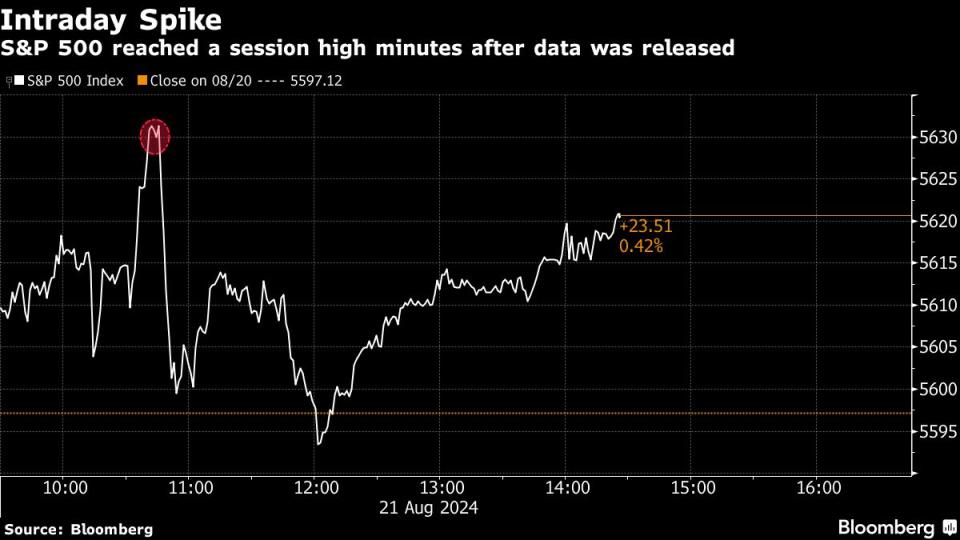Banks obtained crucial jobs data while report was delayed
(Bloomberg) — At least three banks managed to obtain key payroll numbers Wednesday while the rest of Wall Street was kept waiting for a half-hour by a government delay that whipsawed markets and sowed confusion on trading desks.
Most Read from Bloomberg
After the Bureau of Labor Statistics failed to post its revisions to the monthly payroll figures at 10 a.m. New York time, Mizuho Financial Group Inc. (MFG) and BNP Paribas SA (BNP.PA, BNPQY) both called the department and got the number directly. So did Nomura Holdings Inc.'s (NMR, 8604.T) economic research team, according to a person familiar with the situation.
Anger quickly mounted as word spread across Wall Street that the BLS had begun giving out the numbers over the phone. A scramble ensued, with other firms and media outlets, including Bloomberg News, trying to obtain the figures, too.
When the data was finally released around 10:30 am, it showed payrolls will likely be revised down by 818,000 for the 12 months through March, the steepest markdown to the job numbers since 2009. Stocks initially jumped and bonds gained because the report lent support to speculation that the Federal Reserve will start cutting interest rates next month.
“I don’t wonder that people are upset,” Nancy Tengler, the chief executive officer of Laffer Tengler Investments. “The whole thing reeks of incompetence.”
The delay — and subsequent one-by-one disclosure — is the latest in a series of embarrassing mishaps to roil Labor Department data releases, which have been crucial to traders trying to gauge the path of inflation and the economy.
In May, the BLS inadvertently published Consumer Price Index data to its website about 30 minutes ahead of its official release. A month before that, it was reported that an economist from the BLS had answered numerous inquiries from major Wall Street firms like JPMorgan Chase & Co. and BlackRock Inc. on details of data related to the inflation gauge, raising questions about the department’s practices.
In an emailed comment to Bloomberg, a BLS spokesperson said the agency has notified the Labor Department’s Office of the Inspector General about the incident. “The integrity of our data releases is BLS’s top priority and we are closely reviewing our procedures to ensure this does not happen in the future.”
A spokesperson for Nomura declined to comment.
The federal government’s economic data reports were once released under tightly controlled embargos to accredited news agencies, including Bloomberg. But the practice was abandoned during the pandemic, when departments across the government shifted to just releasing the data on the Internet to everyone at once. Officials said that method would better protect the security of market-moving information.
The Wednesday payroll revisions took on heightened significance after the Labor Department’s last employment report showed that payroll growth unexpectedly slowed significantly. That drove Wall Street traders to step up rate-cut bets — all of which could have been upended if the latest data showed surprising strength in the job market.
When it didn’t come out on time, Yelena Shulyatyeva, senior US economist BNP Paribas, said she kept refreshing the web page, waiting for the numbers. Then “we called the public line a couple times and they gave us the number,” she said.
Steven Ricchiuto, chief US economist at Mizuho, did the same. “Knowing the data was delayed we had to call for the number before it showed up on their website,” he said.
Once the data was publicly released, there was a surge of trading. Some 20,000 futures contracts on the S&P 500 Index changed hands between 10:30 a.m. and 10:35 a.m., the period during which BLS’s update was finally out, up 58% from the previous five-minute increment. The S&P 500 jumped before later giving up the gain, while bonds went on to extend their advance.

“I am more than a little annoyed,” said Troy Ludtka, senior US economist at SMBC Nikko Securities America, who was among those who waited on the public release.
“To put it in the most generous terms: Government agencies absolutely cannot be selectively releasing critical, market-moving information to some agents and broker dealers first via telephone while keeping others in the dark,” he said. “This is anathema to the very idea of a balanced market built on fair, accessible information.”
—With assistance from Augusta Saraiva, Sydney Maki, Jessica Menton, Jeran Wittenstein, Christopher Anstey, Katanga Johnson and Isabelle Lee.
Most Read from Bloomberg Businessweek
‘I’m So Scared’: NFL Players on How Betting Changes the Sport
The Little-Known Company That Caught Basketball’s Big Betting Scandal
©2024 Bloomberg L.P.
